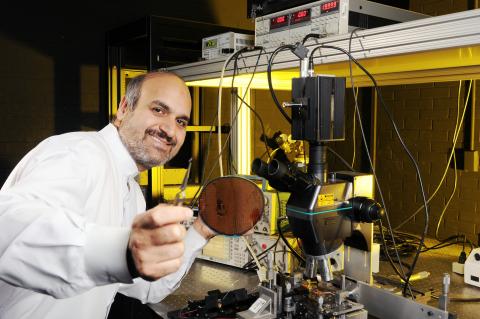ECE Professor Ali Adibi has been chosen for a Defense University Research Instrumentation Program (DURIP) Award by the Army Research Office.
Ali Adibi has been chosen for a Defense University Research Instrumentation Program (DURIP) Award by the Army Research Office. Adibi is the Joseph M. Pettit Chair in the Georgia Tech School of Electrical and Computer Engineering (ECE) and leads the Photonics Research Group.
Adibi received a $145,000 award for his project, “An Ultrafast Testbed for Comprehensive Characterization of Photonics, Electronic, and Optoelectronic Properties of Integrated Nanophotonic Structures.” The goal of this DURIP project is to develop an ultrafast characterization testbed for the characterization of high-speed integrated photonic devices such as high-speed integrated photonic modulators and detectors. This tool will facilitate existing research at Georgia Tech and will enable new research for the study of ultrafast, low-power integrated optoelectronic devices and systems, such as modulators, switches, and detectors. Such devices are essential in multiple applications of integrated nanophotonics, including information processing, communications and networking, sensing, and computing.
Adibi was one of 176 researchers representing 96 research institutions that were announced as DURIP award recipients by the U.S. Department of Defense (DoD) earlier this month. The program supports the purchase of state‑of‑the‑art equipment that augments current university capabilities or develops new capabilities to perform cutting‑edge defense research and associated graduate student research training.
The awards are the result of a merit competition jointly conducted by three DoD research offices: the Army Research Office, Office of Naval Research, and Air Force Office of Scientific Research. A highly competitive program, the three offices solicited proposals from university investigators conducting science and engineering research of importance to national defense. These areas include advances in materials, structures, and manufacturing science; quantum and nanosciences; computing and networks; electronics, electromagnetics, and electro‑optics; acoustics; neuroscience; fluid dynamics; robotics and autonomous systems; and ocean, environmental, and life sciences and engineering.
